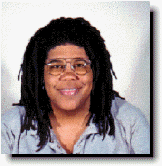The "Miss" Education about
African American Lesbians
By Akilah Monifa
(Reprinted with permission of author)
In 1999 Gay and Lesbian Alliance
Against Defamation (GLAAD) awarded Whoopi Goldberg the Vanguard
Award honoring her work in films such as "The Color Purple" and
"Boys on the Side." The presenters said that Whoopi helped " . .
. educate millions about the experiences of African American
lesbians." Now I'm not knocking Whoopi, quite the contrary, I
have a great deal of admiration for her. I just think that it is
a sad state of affairs when the basis of educating folks of the
experience of lesbian sistahs comes from movies especially one
that was released in the 80s and the other one where Goldberg's
character was lesbian in theory only.
Not that one has to be in a relationship to be a lesbian, but in
particular "Boys on the Side" as well as 1999s "The Deep End of
the Ocean" featured Goldberg's lesbian characters as one-
dimensional beings who were isolated. I know that we are hungry
for positive images in the media and some may ague that some
visibility as long as it is not negative is better than no
visibility at all. I would beg to differ.
Which brings me to question as to why GLAAD could not find an
African American lesbian dead or alive, to honor rather than
someone who portrays one in the media. Maybe it has to do with
the scarcity of visible openly out lesbians in the media.
Yet I don't think homophobia ends because a famous person comes
out or portrays a lesbian. This is 2000 and I think about the
differences in our visibility in the last century. There is no
doubt that lesbian sistahs have been present since time
immemorial. According to Vickie Mays, woman to woman marriages
are widespread and ". . . found in Northern Nigeria among the
Yoruba, Yagoba, Akoko, Nupe, and Gana-Gana communities. It has
been reported in southern Nigeria among the Iba and the Kalabari.
[as well as] the Dinkas', the Barenda of the northern Transvaal,
the Neurs, the Lovedu, and the Kamba in East Africa."
So we do go back to the motherland. And back to the present I
think of the number of homophobic songs recently especially
among African American artists. I'm also reminded of the few
contemporary musicians who are out in terms of their loving
women: Toshi Reagon, Nedra Johnson, and Meshell Ndegeocello to
name a few. I applaud these sistahs for their visibility and
musical presence.
And then we go back not so long ago to the 1920s, 1930s and
1940s to Reagon, Johnson and Ndegeocello's musical mothers. If
it is challenging to be out and visible now, how must it have
been more than fifty years ago in the days of Gertrude "Ma"
Rainey, Bessie Smith, Ethel Waters, and Alberta"Taint No Bodies
Business" Hunter. Yes, all these sistahs were known to shall we
say, enjoyed the delights of their same gender.
Rainey was even arrested in 1925 during an intimate all-female
party with her chorus girls. She mocked her queerness in
"Foolish Man Blues": "There's two things got me puzzled, there's
two things I don't understand: that's a mannish-acting woman,
and a skipping, twistin' woman-acting man." Yet she was at times
noticeably out with "Prove It On Me Blues" first released in
1928, Rainey openly displayed her lesbianism in the lyrics and
in the promotional advertisement for the record. Rainey in the
promo was decked out in a man's hat, jacket, and tie, trying to
". . . seduce two women on a street corner. "All of this
depicted in the presence of an onlooking police officer.
- Went out
last night, and a great big fight
Everything seemed to go on wrong
I looked up, to my surprise
The gal I was with was gone
Where she went, I don't know
I mean to follow everywhere she goes
Folks say I'm crooked, I didn't know
where she took it
I want the whole world to know
They said I do it, ain't nobody caught me
Sure got to prove it on me
Went out last night with a crowd of
my friends
They must've been women, ‘cause I don't
like no men
It's true I wear collar and a tie
Make the wind blow all the while
‘Cause they say I do it, ain't
nobody caught me
They sure got to prove it on me
Wear my clothes just like a fan
Talk to the gals just like any old man
‘Cause they say I do it, ain't
nobody caught me
Sure got to prove it on me.
There always has been and always will be
African American lesbians. We must tell our stories, of our
lives, in song, word, but most importantly through life itself.
We must as Barbara Smith suggests ". . . manifest our lives in
every way possible." This in my opinion means being out and
visible to the greatest extent possible. For we cannot afford to
be invisible. Happy African American history month to all
sistahs and their families. Let's educate ourselves and others
about our lives.
|
Akilah Monifa
Ms. Monifa is a lesbian of African descent, freelance
writer and an adjunct professor of law at New College of
California. She is a contributor to Lesbians in Academia:
Degrees of Freedom, edited by Beth Mintz and Ester D.
Rothblum (Routledge Press 8/97). Ms. Monifa also has a
review of the non-fiction work Darwin's Athletes: How
Sport Has Damaged Black America and Preserved the Myth of
Race in the Jan/Feb
QBR. Ms. Monifa can be
reached at:
amonifa@aol.com
This article was originally published
in Whazzup! Magazine (Volume IV, Issue 9 -- Feb.
2000) and on Chocolate City's Sister Space.
|
|